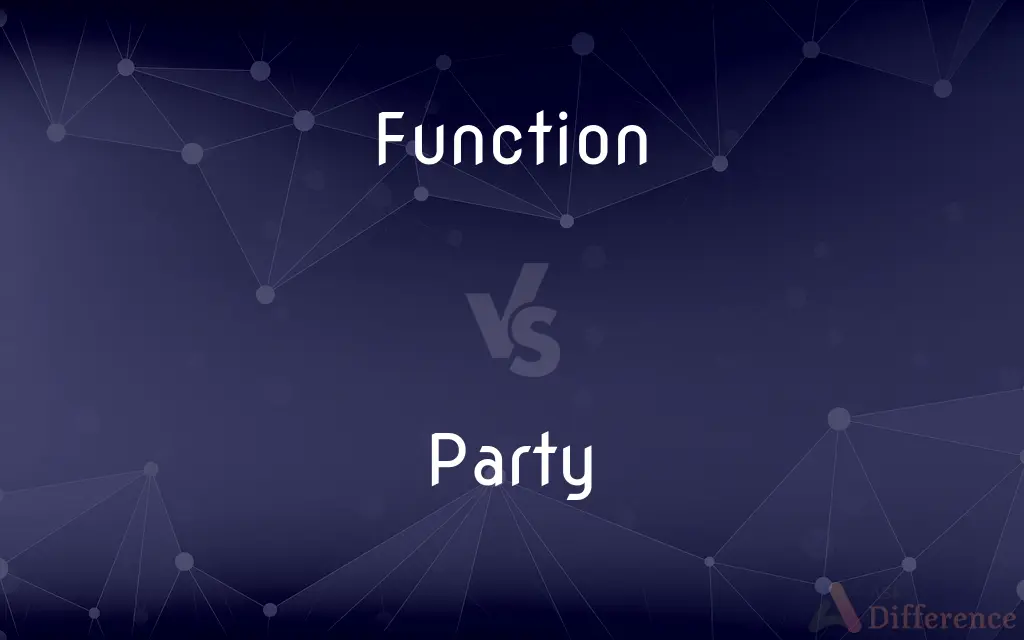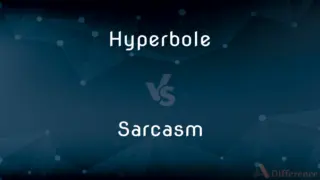Function vs. Party — What's the Difference?
Edited by Tayyaba Rehman — By Urooj Arif — Updated on March 2, 2024
A function is a gathering organized for a specific purpose, often formal or ceremonial, while a party is a social gathering for entertainment or celebration, typically more casual in nature.

Difference Between Function and Party
Table of Contents
ADVERTISEMENT
Key Differences
Function refers to events or gatherings that are organized with a specific objective or purpose in mind. This can range from formal occasions such as conferences, seminars, and ceremonies to more personal but purpose-driven events like weddings and fundraisers. Party, on the other hand, emphasizes social interaction and enjoyment as its primary purpose.
Functions are characterized by their structured nature, often following a planned agenda or program that aligns with their objectives. Parties can be thrown for numerous reasons, including birthdays, holidays, or simply for the sake of gathering friends and family.
Attendees at functions are usually there to participate in the activities related to the event’s purpose, which can include networking, learning, or celebrating particular milestones in a more formalized setting. Unlike functions, parties tend to have a more relaxed and informal atmosphere, focusing on entertainment, music, dancing, and general merriment. While parties can be organized and planned, the emphasis is on fun and enjoyment rather than adhering to a strict schedule or achieving a specific goal beyond the celebration itself.
The distinction between a function and a party largely lies in the event's formality and purpose. Functions are driven by specific objectives and often have a more formal or structured approach to their organization and execution. In contrast, parties prioritize leisure and enjoyment, offering a casual setting for attendees to relax and socialize.
Comparison Chart
Purpose
Organized for a specific objective (e.g., ceremonies, conferences).
Organized for entertainment and celebration (e.g., birthdays, holidays).
ADVERTISEMENT
Atmosphere
Often formal or ceremonial, with a structured agenda.
Casual and relaxed, focusing on fun and social interaction.
Activities
Align with the event’s objective (e.g., speeches, presentations).
Center around entertainment (e.g., dancing, games).
Organization
Planned with a focus on achieving the event's specific goal.
Planned to maximize enjoyment and socializing.
Attendee Participation
Participation often related to the event's purpose (e.g., networking, learning).
Participation focused on celebrating and enjoying the moment.
Compare with Definitions
Function
A formal gathering for a specific purpose.
The charity function raised significant funds for the cause.
Party
Prioritizes fun and celebration.
The retirement party was filled with games and laughter.
Function
Includes events like conferences and seminars.
She attended a function on renewable energy solutions.
Party
A social gathering for enjoyment.
They threw a surprise birthday party for her.
Function
Can be personal but purpose-driven.
Their wedding function included traditional ceremonies.
Party
Focuses on entertainment and socializing.
The beach party featured live music and dancing.
Function
Emphasizes participation related to its objectives.
The function included workshops for professional development.
Party
Offers a casual and relaxed atmosphere.
The costume party allowed everyone to express themselves creatively.
Function
Often follows a structured program.
The award function began with a keynote speech.
Party
Can be thrown for various celebratory reasons.
The New Year’s Eve party was a blast.
Function
An activity that is natural to or the purpose of a person or thing
Bridges perform the function of providing access across water
Bodily functions
Party
A party is a gathering of people who have been invited by a host for the purposes of socializing, conversation, recreation, or as part of a festival or other commemoration or celebration of a special occasion. A party will typically feature food and beverages, and often music and dancing or other forms of entertainment.
Function
Perform duties attached to a particular office or place or function;
His wife officiated as his private secretary
Party
A social gathering especially for pleasure or amusement
A birthday party.
Party
A group of people who have gathered to participate in an activity
A search party.
Party
A group of people gathered together for pleasure;
She joined the party after dinner
Party
A person involved in legal proceedings;
The party of the first part
Party
Have or participate in a party;
The students were partying all night before the exam
Common Curiosities
Can a function also be a party?
Yes, a function can have elements of a party if it includes entertainment and socializing aspects, though its primary purpose remains specific and goal-oriented.
How do you decide if an event is a function or a party?
The distinction is based on the event's primary purpose: if it's organized around specific objectives or formalities, it's a function; if it's for celebration and enjoyment, it's a party.
Can parties have a structured agenda?
While parties can have some planning and structure, such as scheduled activities or themes, they generally emphasize flexibility and enjoyment over strict schedules.
Why is the atmosphere at functions often more formal than at parties?
The formality at functions stems from their purpose-driven nature, requiring a structured approach to achieve their objectives, whereas parties focus on leisure and are inherently more relaxed.
How does the choice of venue differ between a function and a party?
Functions are typically held in venues suited to their specific purpose, like conference halls or banquet rooms, providing the necessary facilities for their activities. Parties can be more versatile, taking place anywhere from homes to outdoor spaces, depending on the desired atmosphere.
Is a wedding considered a function or a party?
A wedding can be considered both: the ceremony and formal receptions are functions with specific purposes, while the reception can also be seen as a party celebrating the union.
Can anyone organize a function, or is it limited to organizations?
While functions are commonly organized by organizations or entities for specific purposes, individuals can also host functions, such as private ceremonies or gatherings with a distinct goal or theme.
Is food served differently at functions and parties?
In functions, food service tends to be more structured, possibly including seated meals or scheduled buffets aligning with the event's agenda. At parties, food is often more casual, with finger foods, snacks, and a focus on easy socializing.
What attire is expected at a function compared to a party?
Attire at a function often aligns with its formal or ceremonial nature, requiring business or formal wear, whereas parties usually allow for more casual or theme-based clothing, emphasizing comfort and personal expression.
How do the goals of attendees differ between functions and parties?
At functions, attendees' goals often relate to the event's purpose, such as gaining knowledge, networking, or celebrating a specific milestone in a formal setting. At parties, attendees aim primarily to enjoy themselves, relax, and socialize without a specific objective beyond the celebration itself.
Share Your Discovery

Previous Comparison
Long vs. Longly
Next Comparison
Hyperbole vs. SarcasmAuthor Spotlight
Written by
Urooj ArifUrooj is a skilled content writer at Ask Difference, known for her exceptional ability to simplify complex topics into engaging and informative content. With a passion for research and a flair for clear, concise writing, she consistently delivers articles that resonate with our diverse audience.
Edited by
Tayyaba RehmanTayyaba Rehman is a distinguished writer, currently serving as a primary contributor to askdifference.com. As a researcher in semantics and etymology, Tayyaba's passion for the complexity of languages and their distinctions has found a perfect home on the platform. Tayyaba delves into the intricacies of language, distinguishing between commonly confused words and phrases, thereby providing clarity for readers worldwide.
















































